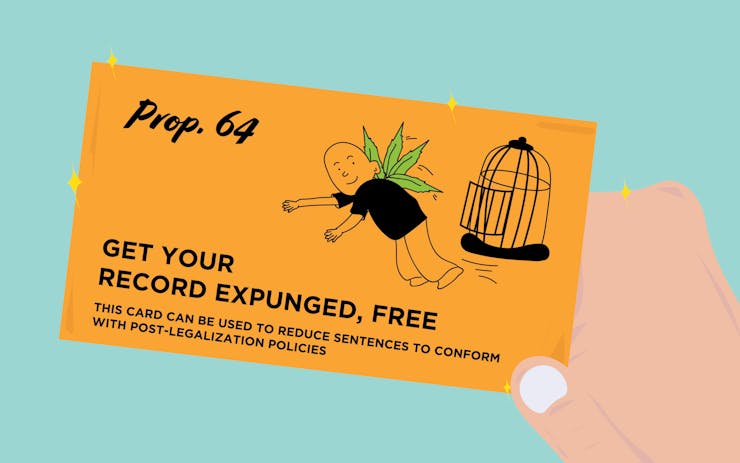When doors to California’s first adult-use cannabis shops opened on New Year’s Day, network television cameras were on the scene to the capture long lines, free food, and live music. But the shots on the nightly news didn’t tell the whole story. While the passage of Proposition 64 marked a new chapter in commercial cannabis, it also opened the door for more than a million people impacted by the drug war to finally improve their lives.
“Prop. 64 really does have the ability [to], and oftentimes does, just change peoples lives,” said Nick Stewart-Oaten, a deputy public defender in the LA County Public Defender’s Office who handles cannabis cases under the new law. “It literally gives people a job, it can literally keep people from being deported, it literally gives them hope.”
Nearly a million people have criminal records more tarnished than they deserve.
After voters passed the state’s adult-use legalization measure in 2016, many people with past cannabis convictions became eligible to have their charges reduced or expunged completely. It was an opportunity to clear up blemishes on their records from past conduct that’s now legal, and it promised to ease access to housing, employment, and public programs.
One of Stewart-Oaten’s clients, a grandmother convicted selling a dime bag to an undercover officer nearly 30 years ago, has felt the effects of the new law firsthand, he said. Though she paid for her crime long ago, the conviction followed her for decades, and because of it, the federal government has tried to deport her. The passage of Prop. 64, however, has enabled the woman to have the charge dismissed, he said, and it now appears that move will prevent her deportation.
More than a million other people are eligible for relief under California’s legalization law, according to the Drug Policy Alliance, but the process has been slow going. Court numbers from roughly a year after the law was passed showed that fewer than 5,000 people had filed petitions for relief.
[Editor’s note: Looking for help navigating California’s expungement process? The nonprofit Drug Policy Alliance is hosting a series of free expungement seminars in the greater Los Angeles area. The first one is on Saturday, March 17.]
Local officials in some parts of the state have started to take action themselves to speed the process. In Sacramento, legislation would entrust the handling of cases to county courts, though some have already expressed reservations over whether they could take on the process. Meanwhile, nearly a million people have criminal records more tarnished than they deserve.
What Went Wrong
The reasons for the slow rollout are many. For one thing, California’s cannabis law is downright complicated. “Our first challenge was just understanding what the new law said,” explained Stewart-Oaten. The next step was getting the word out to people, most of whom had known Prop. 64 as simply a legalization effort. “Most people just don’t know that they’re eligible to get their lives back,” he said.
In Los Angeles County, there are approximately 200,000 cases that qualify for reduction or dismissal, but as of last month, only about 600 applicants have come forward.
When they do, they’re met with a series of bureaucratic hoops to jump through that can include multiple rounds of paperwork and court appearances. Without the aid of a public defender, the process can be even more daunting—and expensive. Hiring a private attorney to guide the process isn’t cheap, and going it alone is complicated. Without the help of a lawyer, Stewart-Oaten said, applicants may mistakenly request a reduced charge when they’re entitled to a full dismissal. Such an oversight could leave someone with a “slightly less dirty” criminal record instead of the completely clean one to which they’re due.
Spurring Action Statewide
At least one state lawmaker has had enough of this long, laborious process. Assemblyman Rob Bonta, whose district includes Alameda and parts of Oakland, is pushing legislation that would essentially make expungements happen automatically.
Introduced last month, Assembly Bill 1793 would put the onus of expungement on the courts, mandating they reduce or expunge all relevant criminal convictions. No longer would individuals be required to file complicated petitions or navigate the hallways of a county court.
“This bill does not create any new substantive right,” Bonta explained in an interview. “It simply is a practical approach to speeding up and making more efficient a right that already exists.”
One of the “fundamental roles” government should play is removing barriers and expediting processes, Bonta said. He feels the expungement process created through Prop. 64, he said, has just too many hurdles, including forcing applicants to pay a fee, possibly hire an attorney, and often take time off work to attend hearings.
“If a person can have their past mistakes wiped clean without any danger to the rest of us, that should happen.”
Under Bonta’s proposed bill, the superior court system in each California county would be obligated to identify individuals who have been processed through that criminal court. The bill would then require them to expunge or reduce the conviction in accordance with current law.
While many courthouses in the state are still heavily reliant on paper files and some have expressed concerns about the additional burden of reviewing old cases, Bonta said he believed courts would be fully capable of complying. “This idea that it’s too hard or too burdensome or too costly or too difficult is really hard for me to swallow,” he said.
Though AB 1793 has received support from social justice groups and cannabis organizations, it remains unclear how it will be received by law enforcement, Bonta said.
The bill has earned a “tremendous amount of attention” from the media, constituents, and criminal justice observers, said Jerome Parra, Bonta’s communications director, but it’s still too early to predict its chances. The deadline for submitting bills for the 2018 legislative session was just last week, he noted, and many groups are still determining how they’ll vote on different measures. One group, the California Growers Association, which represents the state’s small and midsize growers, has already endorsed the bill.
Supporters still have some time to muster support before the measure is scheduled for a vote. It’s expected to be considered by multiple committees, sometime in March or April, Parra said.
Efforts at the Local Level
As Bonta’s bill awaits action in the Capitol, some officials across the state are taking steps to address convictions at the local level. In some counties, the action could even free individuals still behind bars serving penalties no longer on the books.
Last month, San Francisco District Attorney George Gascón announced his office will review all cannabis-related convictions dating back to 1975—a process he’s said could automatically dismiss more than 3,000 misdemeanor charges and resentence nearly 5,000 felonies. “While drug policy on the federal level is going backwards, San Francisco is once again taking the lead to undo the damage that this country’s disastrous, failed drug war has had on our nation and on communities of color in particular,” said Gascón in a statement.
Within days, San Diego announced a similar plan of action. The county expects a total of 4,700 felony and misdemeanor cases will be reviewed and either reclassified or expunged. Working together, the district attorney’s and public defender’s offices have also identified high-priority cases—including 55 people currently incarcerated—whose files to process first, the San Diego Union-Tribune reports.
Expungement’s Everyday Impacts
Even for those who never served time, marijuana convictions can cause long-lasting fallout, which many in California argue should no longer be happening. The passage of Prop. 64, along with Proposition 47, which reclassified and reduced sentencing for certain minor crimes, is a sign of a broader trend in California, Stewart-Oaten said. It’s a direction that avoids criminalizing nonviolent offenses to the extent possible, recognizing that individuals convicted of crimes such as trespassing or marijuana possession will continue to be punished after they serve time or pay fines. Convictions follow them through their lives, often preventing people from landing a steady job, securing housing, or accessing certain public benefits.
This damaging cycle disproportionately impacts minority communities, which have been unfairly impacted by what Lt. Gov. Gavin Newsom has called the “racially discriminatory system of marijuana criminalization.” High arrest and incarceration rates of black and Latino populations don’t correlate with higher rates of drug use, the Drug Policy Alliance says, but is better explained by law enforcement’s targeting of “urban areas, lower income communities and communities of color.”
“If a person can have their past mistakes wiped clean without any danger to the rest of us, that should happen,” Stewart-Oaten said. For Californians who think they may be eligible for changes to their criminal record under Proposition 64, he recommended contacting a local public defender’s office for help starting the process. There is no deadline for filing a petition for charge expungement or reduction.
“Theoretically,” he said, “we could still be doing these in 20 years.”






